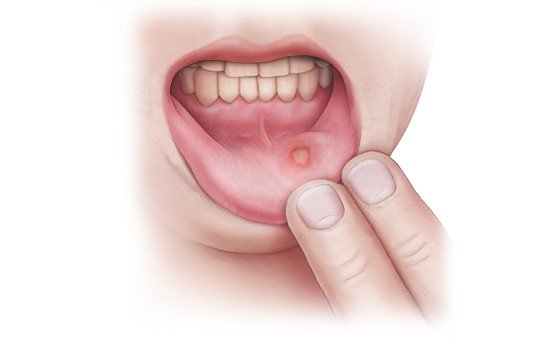Al-Zainal Z, Farid Ashraf S, Gopinath D. Clinical efficacy of lasers in the management of recurrent aphthous ulcers of oral cavity: a systematic review of randomized control trials. Lasers Med Sci 2025; 40(1): 49.
Altenburg A, El-Haj N, Micheli C et al. The treatment of chronic recurrent oral aphthous ulcers. Dtsch Arztebl Int 2014; 111(40): 665-673.
Brocklehurst P, Tickle M, Glenny AM et al. Systemic interventions for recurrent aphthous stomatitis (mouth ulcers). Cochrane Database Syst Rev 2012; (9): CD005411.
Deutsche Gesellschaft für Mund-, Kiefer- und Gesichtschirurgie (DGMKG), Deutsche Gesellschaft für Zahn-, Mund- und Kieferheilkunde (DGZMK). S2k-Leitlinie Diagnostik und Therapieoptionen von Aphthen und aphthoiden Läsionen der Mund- und Rachenschleimhaut. AWMF-Registernr.: 007-101. 2023.
Han M, Fang H, Li QL et al. Effectiveness of Laser Therapy in the Management of Recurrent Aphthous Stomatitis: A Systematic Review. Scientifica (Cairo) 2016: 9062430.
Khaleel Ahmed M, Jafer M, Nayeem M et al. Low-Level Laser Therapy and Topical Medications for Treating Aphthous Ulcers: A Systematic Review. J Multidiscip Healthc 2020; 13: 1595-1605.
Radithia D, Mahdani FY, Bakti RK et al. Effectiveness of low-level laser therapy in reducing pain score and healing time of recurrent aphthous stomatitis: a systematic review and meta-analysis. Syst Rev 2024; 13(1): 192.
Staines K, Greenwood M. Aphthous ulcers (recurrent). BMJ Clin Evid 2015: 1303.
Suter VG, Sjölund S, Bornstein MM. Effect of laser on pain relief and wound healing of recurrent aphthous stomatitis: a systematic review. Lasers Med Sci 2017; 32(4): 953-963.
IQWiG health information is written with the aim of helping people understand the advantages and disadvantages of the main treatment options and health care services.
Because IQWiG is a German institute, some of the information provided here is specific to the German health care system. The suitability of any of the described options in an individual case can be determined by talking to a doctor. informedhealth.org can provide support for talks with doctors and other medical professionals, but cannot replace them. We do not offer individual consultations.
Our information is based on the results of good-quality studies. It is written by a team of health care professionals, scientists and editors, and reviewed by external experts. You can find a detailed description of how our health information is produced and updated in our methods.


